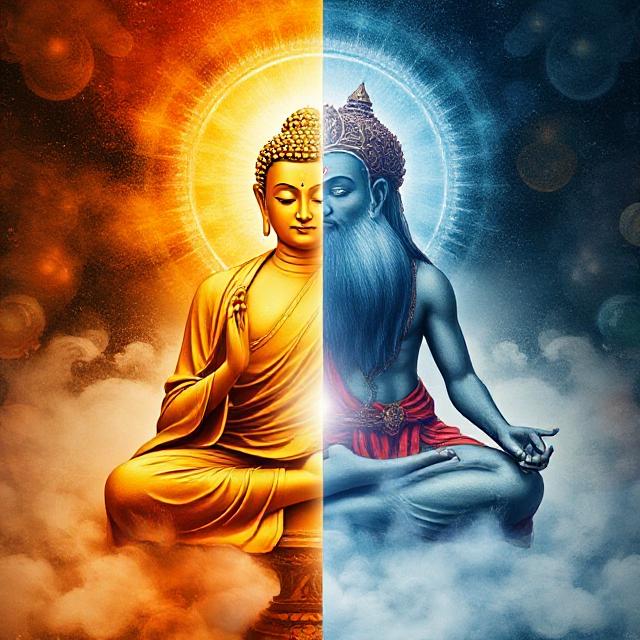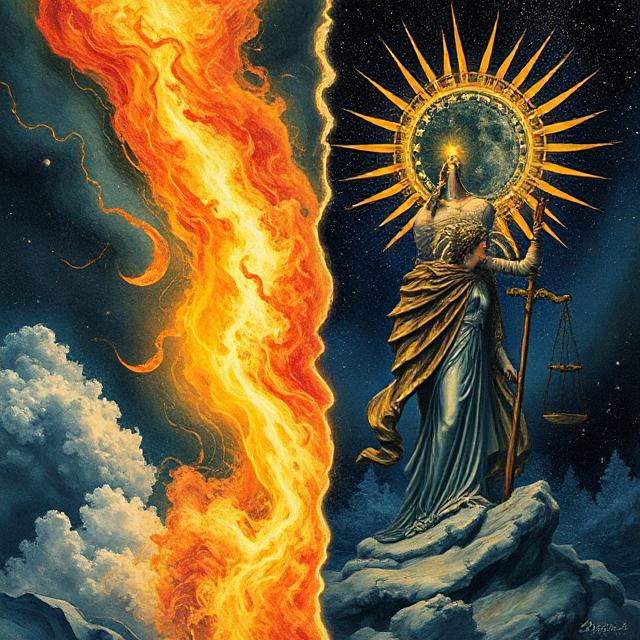
Table of Contents
Buddhist Anatta vs Hindu Atman
Buddhist Anatta vs Hindu Atman is more than a theological comparison—it’s a deep investigation into the nature of identity, consciousness, and liberation. Are we eternal souls journeying toward unity with the divine, or is the self a construct to be dissolved in the fire of insight?
This contrast between Buddhism and Hinduism shapes not only metaphysical views but also ethics, meditation, and salvation itself. To understand it is to peer into the heart of Eastern philosophy and come face to face with what it means to exist.
I. Atman: The Hindu Concept of Self
In Hindu philosophy, particularly in the Vedanta tradition, Atman refers to the true self—unchanging, eternal, and divine.
Key Beliefs:
- Atman is Brahman: The soul is not separate from the ultimate reality; it is identical to Brahman, the absolute.
- Self-knowledge leads to liberation (moksha): Realizing your identity with the divine ends the cycle of rebirth (samsara).
- Layers of self: Hindu psychology includes layers like the body, mind, intellect, and ego—all of which veil the Atman.
“That which is the finest essence—this whole world has that as its soul. That is Reality. That is Atman. That art thou.” — Chandogya Upanishad 6.8.7
Atman is not the ego, emotions, or thoughts. It is pure, infinite awareness, hidden beneath worldly illusion (maya).
Hindu practices like yoga, devotion (bhakti), and meditation seek to strip away ignorance and awaken this inner divinity.
II. Anatta: The Buddhist Denial of Self
Buddhism turns this idea on its head. The Buddha taught Anatta—no-self—as one of the three marks of existence (along with impermanence and suffering).
Key Beliefs:
- No unchanging self: What we call “self” is just a collection of skandhas—body, sensation, perception, mental formations, and consciousness.
- Attachment to self causes suffering: Clinging to an illusory self fuels desire, aversion, and delusion.
- Liberation (nirvana) comes from realizing no-self: Freedom arises when we let go of ego and illusion.
“All conditioned phenomena are impermanent; all phenomena are without a self.” — Dhammapada 277–278
Buddhist practice—especially insight meditation (vipassana)—is aimed at seeing this truth directly. The meditator observes thoughts and sensations arising and passing, noticing there is no solid “I” behind them.
This does not mean nihilism. Rather, it’s a shift from identity to process—a river of experience, not a permanent self.
III. Anatta vs Atman: The Soul Debate
Let’s compare these two conceptions:
| Aspect | Hindu Atman | Buddhist Anatta |
|---|---|---|
| Nature of Self | Eternal, unchanging soul (Atman) | No permanent self (Anatta) |
| Relationship to World | Atman is Brahman (all is one) | Self is illusion; all is process |
| Path to Liberation | Realize true self through knowledge | Realize emptiness of self through insight |
| View of Ego | False covering over true self | Construct with no real existence |
| Metaphysical Core | Being | Becoming |
The tension here is profound. Hinduism asserts an enduring essence; Buddhism denies it entirely. Yet both aim at liberation and recognize the danger of egoic attachment.
Some modern scholars argue that the difference may be semantic—a matter of emphasis rather than absolute contradiction. Others insist they are fundamentally incompatible.
IV. Philosophical Implications
1. What Is Identity?
Hinduism says we are eternal witnesses. Buddhism says we are nothing but change. So what are we?
This debate informs not just religion but psychology and neuroscience:
- Are we a soul, a self, a pattern of thought?
- Can subjective experience exist without a subject?
2. Ethics and Behavior
- Hindu ethics often focus on fulfilling one’s dharma (duty), connected to one’s soul-path.
- Buddhist ethics aim to reduce suffering by eliminating attachment and delusion.
Each view influences behavior:
- Atman encourages self-realization.
- Anatta encourages self-transcendence.
3. Death and Rebirth
Both traditions believe in reincarnation, but the mechanism differs:
- Hinduism: The soul carries karma from one life to the next.
- Buddhism: No soul—karma continues, but no self is reborn.
This leads to radically different understandings of what persists after death.
V. Can They Be Reconciled?
While many see them as opposites, others seek synthesis:
- Modern Advaita Vedanta sometimes interprets Anatta as a step toward realizing Atman.
- Thich Nhat Hanh suggested that seeing no-self doesn’t mean non-being, but inter-being—everything exists in relation.
Mystics on both sides report similar experiences: loss of ego, union with all, deep peace. Perhaps they describe different paths to the same mountaintop.
VI. Journal Prompts: Reflecting on the Self
- Do you believe you have a soul? Why or why not?
- How would your life change if you truly accepted the idea of no-self?
- Which view—Atman or Anatta—feels more intuitive to you?
- Can you experience unity without believing in a self?
VII. Book Suggestions
- The Heart of the Buddha’s Teaching by Thich Nhat Hanh
- The Upanishads (Eknath Easwaran translation)
- I Am That by Nisargadatta Maharaj
- Why Buddhism is True by Robert Wright
TL;DR Summary
- Buddhist Anatta vs Hindu Atman is a deep divide over whether the self exists.
- Atman is the eternal soul; Anatta is the denial of any unchanging self.
- Both paths aim at liberation but take radically different routes.
- Whether we are eternal beings or flowing processes, the goal remains: freedom from suffering and the illusion of separateness.

